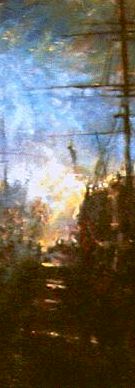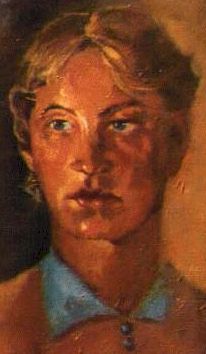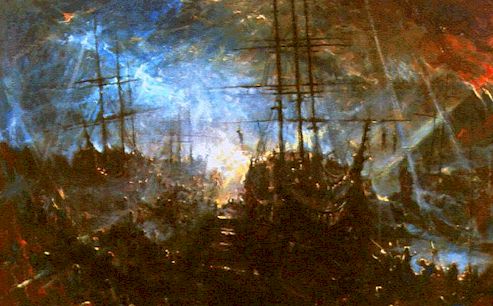|

THE HANGING OF THE MUTINEERS
At nine sharp a lanyard attached to a dog head was released and a flint
struck a spark into a pan which ignited a tiny pool of black powder. The
powder sizzled down a touch hole and exploded a compressed canvas bag full
of gunpowder. The ensuing explosion fired a wad noisily but harmlessly
across the water. On the same ship, as the white cannon smoke dissipated,
a yellow flag was hoisted. The yellow flag was a summons to an execution
and it demanded the attention of the whole Channel Fleet.
Pasley's crew, and every other
according to naval law, were assembled to witness the proceedings. Launches,
cutters, dingys and other assorted vessels from every ship of the channel
fleet formed a close perimeter around HMS 'Brunswick'. The battleship's
deck was crowded with officers, while all around were redcoated marines
armed with swords and bayoneted muskets, both to prevent the prisoners
escape and to keep the spectator craft at bay.
Along the shore, afloat in
ferries and pleasure boats, were men, women and children. Thousands had
come to watch. There was no thought of an event of sorrow and solemnity
this was a carnival, a spectacle, a circus. Jugglers, whores and entertainers
plied their trade on the nearby docks. Others rowed among the pleasure
boats. Picnics and hampers were unpacked and table cloths spread.
 |
The captains of the fleet sat assembled around
Lord Hood on the poop deck and were served delicacies and port as they
chatted and waited the proceedings. At eleven Hood motioned to his aide
Captain Curtis for the prisoners to be summoned up. Curtis stood and gave
instructions to his marine lieutenant who disappeared below with a platoon
of redcoats.
A hush fell over the crowd
as the mutineers emerged from their darkness. They blinked as they looked
around, startled at the brightness and the noise, and size of the crowd
which in roared and shouted to each other. People strained around corners,
over heads, under awnings, to catch a sight of the condemned. People in
boats layed their hands on the shoulders of the people before then, fathers
lifted children and loved ones high in the air to get a better view, others
stood on tiptoe, upon gunwales, upon next to nothing, all trying to observe
every inch of those about to die. |
Pasley, seated with Hood and the
other captains on the poop, watched the condemned arrive. Like tired actors
about to play their final scene, he thought, but suddenly, he noted they
took their lead from Millward and they stiffened with resolve. They stepped
forward, heads up, and passed through the lines of the assembled crew to
make their way aft to the quarter deck. Like hundreds of others Pasley
gasped when he observed the bearing and proud splendour of young Tom Ellison
who smiled and waved as he walked between the two adults. Then even more
surprise when his gaze then fell on a grim trio of Graham, Morrison and
a clergyman following behind. It was the first time he had sighted Graham
since the tribunal, and in a place he least expected.
By naval regulation able and
common seamen were arranged along the deck in three columns of twenty men.
Yard ropes stretched along each line passing through each man's hands and
up to three separate block and tackle that hung and exact twelve inches
below the mizzen yard. The block and tackle were to ensure a slow and even
pull on the ropes. Two of the tackle were to port and one to starboard.
From these blocks, and reaching to five feet above the deck, were the plaited
nooses.
Some of the sailors nervously
fingered the ropes as if they were serpents instead of simple woven hemp
while others just looked at the mutineers and wondered which would step
into their particular noose.
The prisoner's separation took
place amidships with Ellison and Millward to be hanged on the port arm.
Graham went to stand behind Ellison. Except for the leg irons the chains
on all three had been removed.
As required a corporal read
out the charges and the sentence then invited last words from the condemned.
On the cat head Millward paused and motioned to Morrison who handed him
a paper. He looked at it, raised up his head, surveyed the audience. Then
in a voice that began with a falter but soon boomed out across the water
he addressed the ship's company;
"My Lords, officers and
fellow crew members. I speak for myself and for my two companions when
I say we deeply regret out part in the mutiny on HMS 'Bounty'. We
would like to apologise to the families who lost husbands and sons in the
unfortunate consequences of that event, especially those who were lost
by accident or illness. They were Thomas Leward Surgeon, David Nelson Botanist,
William Elphinstone Master's Mate, Peter Linkletter Quarter Master, Seaman
Thomas Hall, Seaman Robert Lamb and big John Norton. They did us no harm
and did not deserve to die so far from home. For that we are truly sorry.
We three common sailors that
stand before you now, were not pressed men, nor were we recruited from
prison, instead, we actively chose the life of a sailor. Yes, we were aware
of the hardships, exploitations and brutalities that lay in our path, and
we welcomed them. The reality of our life was salt sores, it was of freezing
or sweating it was of poor pay and the barren taste of ship's biscuit.
It was of hardship and the stench of bilges but it was also of mateship
and sharing. We shared hammocks and biscuit, heads and whores. We fought
and bitched and looked after one another. We have no regrets, we were well
aware of the dangers. My heart touches the many remembrances long fallen
asleep of close friends, of shared hunger, of cold and wet backs, of women,
ale and the good times. My desire then, from my youth was to see strange
countries and fashions.
Many have asked me why we mutinied
and my answer is this?ateship is our privilege, and one that the landsman
should not presume upon or quickly judge. Perhaps you should all remember
the words of Mr Garrick's song;
'Now cheer up my lads, 'tis
to glory we steer,
To add something more to this
wonderful year:
Tis to honour we call you,
as freemen not slaves,
For who are so free as the
sons of the waves?'
'Millward looked up from
his notes and a braced purpose entered his body while a kind of inspiration
shone from his eyes. It not only contradicted his manner but changed and
raised the man. He turned to the youth standing beside him, "We are
not afraid to die ... even young Tom." And he stared long at the regally
attired youth shaking his head – "and if the country will profit by
our death ..." his voice wavered and he finished quickly, "May
God forgive us all." He turned to his executioners, "we forgive
you mates, look sharp and pull hard on the ropes."
A marine whispered to Ellison
who nodded his understanding. He carefully, gratefully, unlocked the silver
clasp, shed his cloak, folded it and handed it to Graham. Then he turned
and presented his arms behind his back to the man with the binding cords.They
tied his arms and those of Milward and Burkitt. A little time was spent
in personal devotion during which Morrison performed the last officers
to Millward and Burkitt by placing the nooses over their heads. Graham
did the same for Ellison. For a while Millward and the boy stood together
and they spoke as if they were alone. Voice to voice, eye to eye, heart
to heart, like two children of the same God. Together they viewed the same
dark highway. Together they would travel it and Millward promised to lead
the way.
 |
Graham stepped forward, bent
over and whispered into Ellison's ear then, taking a shoulder under each
hand, viewed him closely. The youth smiled, and in an unexpected and strange
movement leaned forward and he kissed the older man.
Graham stiffened and pushed
the youth away.
Again the cannon fired and
the long columns hauled on the ropes and the mutineers were slowly hoisted
above the crowd. The able seamen that pulled mostly looked down at their
hands where the plaited hemp shook; where they felt the struggle of life
pass along the rope?nto their hands, up their arms to lodge as part of
their memory rarely to be visited hence. They were destined to pull many
more ropes but few would feel as heavy and require so little strength.
|
The clergyman, who felt he needed
to say something. shouted out. 'So the rustling of an angel's wings blends
with the echoes of the watchers' gasps and its victims are no longer wholly
of earth but have about them that breath of heaven.'
The bodies rose further into
the air and as Ellison felt the rope tighten he held his breath. He kept
his body completely stiff and tried to control his bladder and bowel. The
concentration made him sweat, stare and bulge his eyes. It was difficult
but he knew he must try, and keep trying. If only he could hold himself
back.
Graham's stood four paces in
front of Ellison and watched his eyes. He saw the glassy concentration,
the widening of the pupils as the boy's body tried to resist the ropes
stranglehold. By the time Ellison's his feet reached Graham's eye level
Graham knew the boy was losing the battle. The limbs were twitching and
the body was beginning its involuntary spasms. The eyes grew even wider
as Ellison's alarm slid toward panic.
The crowd turned their attention
to Burkitt who had somehow managed to free his arms. Even though he was
unconscious his hands alternatively tore at his neck flayed uselessly in
the air?ut to no avail, too late.
For the next thirty minutes
most watched and felt comforted by their life ...their petty complaints
disappeared as surely as the futile struggle above would cease. As usual
some thought of having more children.
Death by strangulation with
a yard rope pulled by their comrades was the way of all naval executions.
In the end with tongues and eyes protruding the fouled bodies appeared
strangely shrunk. Nothing as quick as the French guillotine, thought Pasley,
it would have dispatched thirty in the same time?nd was currently doing
so. He wished Bligh were present... and Christian.

Graham watched as the corpses
were gently lowered to the deck. The extreme care now taken contrasted
with the roughness used before. He moved over to examine the corpse. Ellison
could as well as been asleep such was the state of the body, the look on
the face – the calm, the peace. Was it not for the rope and its impression
there were no signs of strangulation, not like the others.
The ship's surgeon mistook
the look on Graham's face, "I have heard tell of such but never observed
one Mr Graham."
"What?"
"The rope did not kill
him sir he was dead before the rope."
"Bloody nonsense."
"I have heard if the soul
wills it the heart can stop by itself," he was a man who loved superstition
and legend and was intent on producing another. He pointed down,"
just like this one 'ere. The first one I have ever seen though, remarkable!
Look at the face no burst blood vessels nothing, remarkable. Aye sir, this
one were dead before he was hung."
Graham growled and looked at
his guards as if to order himself away.
"Do you want his clothes
back?" the superstitious butcher shouted. Everyone knew that by tradition
the surgeon usually got to keep the clothes, one of the benefits of the
job.
Strangely at the mention of
the clothes something as hard as diamond suddenly cracked inside the advocate.
|